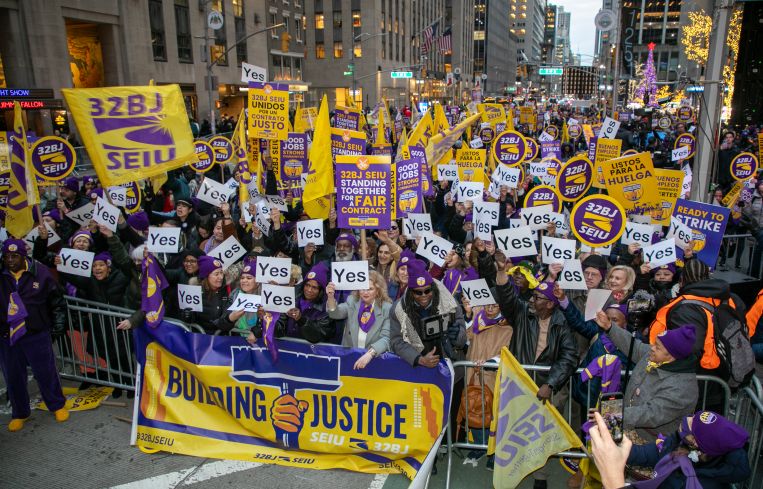NYC Commercial Building Workers Authorize Strike
20,000 employees are ready to walk off the job over proposed cuts to wages and benefits
By Abigail Nehring December 20, 2023 4:34 pm
reprints
New York City commercial building workers voted overwhelmingly on Wednesday to authorize a strike if landlords don’t cede ground before their contract expires Dec. 31.
The vote paves the way for 20,000 members of 32BJ Service Employees International Union to walk off the job if negotiations with the Realty Advisory Board (RAB) — which represents the landlords of about 900 commercial buildings around the city — remain at a standstill by the end of the year.
The two sides are at an impasse over changes to workers’ wages and health benefits. Commercial landlords say their bleak economic outlook is more than enough to justify cost-cutting measures, while workers balk at the proposed concessions. For many, the memory of working on the frontlines of the pandemic is still fresh.
“I’m just hoping that the RAB board will realize how hard we have worked,” Ena Softley, a 66-year-old cleaner at Rudin’s 3 Times Square, said. “All we need is a contract. We don’t really want to be out in the cold. We don’t want to leave our jobs. We do not want to strike, but we will if we have to.”
Much has changed since the two sides came to the table to hash out a new contract in 2019. The union won a 10.8 percent wage increase that year, bringing the average worker’s hourly wage to about $29.
“Bargaining is always hard, even when the industry is seeing rapid growth in values and rents,” 32BJ President Manny Pastreich said on Tuesday night before this week’s vote. “But in this one, they feel like they need relief, and that’s an argument they haven’t made before.”
Pastreich said the parties have made little progress since negotiations began last month.
Commercial landlords are looking for a contract that reflects “the horrible economic conditions RAB members face,” RAB President Howard Rothschild said in a statement Wednesday.
“The current labor agreements contain healthcare provisions and unsustainable work rules that do not exist in any other major city in the country nor in other 32BJ contracts outside New York City,” Rothschild said. “We hope to reach a deal by the deadline that protects the future of the industry and our workforce.”
The board is asking workers to kick in on health insurance premiums — a nonstarter according to the union. 32BJ has a self-funded health plan and has worked to keep health insurance costs down. Its members are among the minority of American workers who do not bear any of the cost of their insurance premiums.
The board is also proposing a lower pay rate for new hires and other changes it refers to as “enhanced flexibility.”
But 32BJ leaders disparage this idea, saying it’s akin to the two-tier wage system auto industry workers overturned this fall.
“If the question is have we made progress, the answer is a very resounding no,” Pastreich said.
The last time commercial building workers went on strike was 1996, though members have authorized a strike and narrowly averted it on several occasions since then, including in 2019.
With the clock is ticking towards the end of the year, Mayor Eric Adams, U.S. Senator Chuck Schumer, New York Attorney General Letitia James and other top Democrats threw their support behind the union at rally in Midtown just before the strike authorization vote Wednesday afternoon.
“You are our soldiers. You are our heroes. Our nation owes you a huge debt for when you fought COVID on the front lines,” Schumer said to a sea of union members gathered on Avenue of the Americas. “I want to say one thing to the big bosses: Show us the money.”
The next bargaining session will take place Thursday. The chance to finalize a contract and avert a strike hinges on five sessions scheduled to take place before the end of the year.
Abigail Nehring can be reached at anehring@commercialobserver.com.



